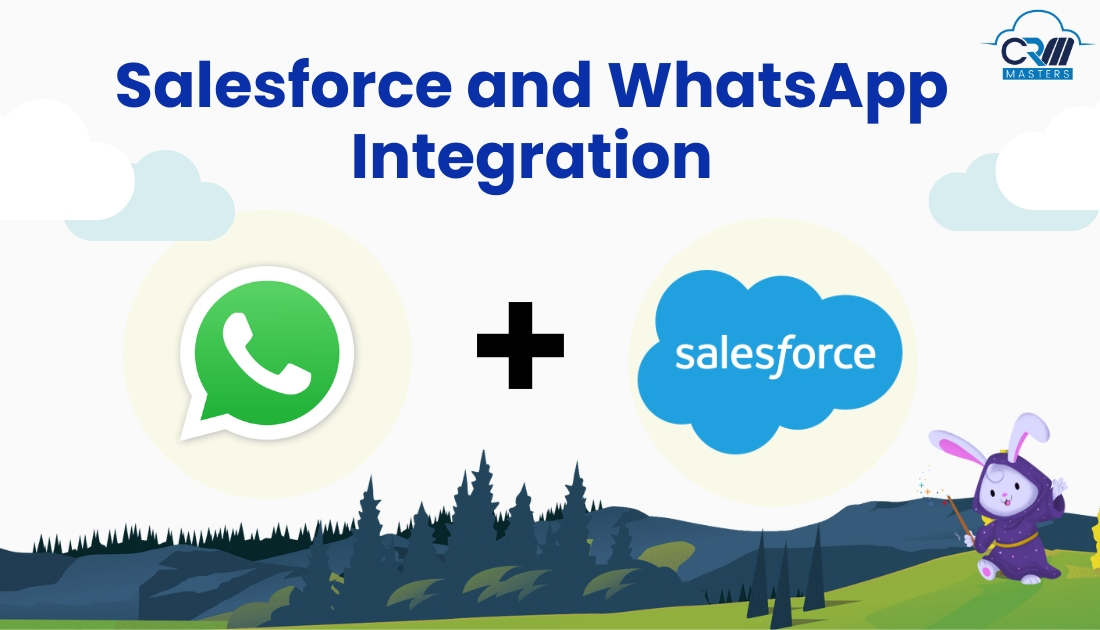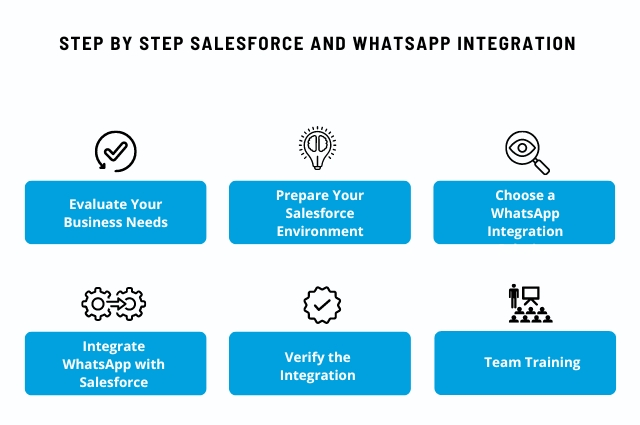
Salesforce and Whatsapp Integration: What’s the Future?
Nowadays, businesses are continually seeking new ways to engage with their customers effectively. With the rise of messaging platforms and the importance of customer relationship management (CRM) systems, the integration of Salesforce with WhatsApp emerges as a powerful solution. The integration gives businesses an easy way to communicate, helping them improve how they interact with customers and make their work smoother.
Salesforce, as a leading CRM platform, is renowned for its ability to centralize customer data, streamline sales processes, and drive business growth. On the other hand, WhatsApp, with its massive user base and easy accessibility, has become one of the most popular messaging platforms globally. By integrating these two powerful tools, businesses can unlock new possibilities in customer communication and relationship management.
Why Salesforce and WhatsApp Integration is a Game-Changer for Businesses
Getting a high percentage of customer satisfaction requires effective communication. The integration of Salesforce with WhatsApp presents a game-changing opportunity for businesses to elevate their communication strategies.
Here’s why:
Better Business Communication:
Integrating WhatsApp with Salesforce allows businesses to communicate with customers in real-time, leveraging the familiarity and convenience of the messaging platform. Whether it’s responding to inquiries, providing support, or sharing updates, businesses can engage with customers seamlessly.
Customer Service Automation:
Businesses can automate routine customer service tasks, such as answering frequently asked questions, scheduling appointments, or sending notifications. This automation not only improves efficiency but also ensures consistent and prompt responses to customer queries.
CRM Solutions:
Salesforce serves as the backbone of customer relationship management, enabling businesses to manage leads, track interactions, and analyze customer data effectively. Integrating WhatsApp with Salesforce improves this CRM ecosystem by incorporating messaging conversations directly into customer profiles.
Salesforce Integration Benefits:
Benefits like increased productivity, streamlined communication workflows, and improved customer satisfaction. By consolidating customer interactions within Salesforce, businesses can gain a comprehensive view of each customer’s journey and tailor their strategies accordingly.
WhatsApp Business API:
The introduction of the WhatsApp Business API further enhances the integration capabilities, allowing businesses to access advanced features such as message templates, chatbots, and analytics.
Also Read: HubSpot and Salesforce Integration
Step-by-Step Salesforce and WhatsApp Integration

Setting up Salesforce and WhatsApp integration may seem complex at first, but with the right guidance from Salesforce Consulting Partner, businesses can seamlessly integrate these two platforms.
Here’s a guide to help you get started:
Evaluate Your Business Needs:
Before diving into the integration process, assess your business requirements and objectives. Identify the key use cases for integrating Salesforce with WhatsApp, such as customer support, sales outreach, or marketing campaigns.
Prepare Your Salesforce Environment:
Ensure that your Salesforce environment is set up correctly and configured to integrate with external applications. This may involve customizing objects, fields, and workflows to accommodate WhatsApp integration.
Choose a WhatsApp Integration Solution:
There are several third-party solutions and tools available for integrating WhatsApp with Salesforce. Research and select a solution that aligns with your business needs and budget. Consider factors such as compatibility, features, and customer support.
Integrate WhatsApp with Salesforce:
Follow the instructions provided by your chosen integration solution to connect WhatsApp with Salesforce. This typically involves installing and configuring the integration app, mapping data fields, and setting up automation rules.
Verify the Integration:
Once the integration is set up, thoroughly test its functionality to ensure that messages are being sent and received correctly between Salesforce and WhatsApp. Verify data synchronization, message delivery, and automation triggers to validate the integration’s effectiveness.
Team Training:
Provide training to your team on how to use the integrated Salesforce and WhatsApp systems effectively. Educate them on best practices, guidelines, and workflows for communicating with customers via WhatsApp within the Salesforce.
Trends in Integrating Messaging Apps with CRMs
As technology continues to evolve, the future of customer relationship management will be shaped by trends in integrating messaging apps like WhatsApp with CRMs such as Salesforce.
Here are some key trends to watch out for:
AI-Powered Chatbots:
The integration of AI-powered chatbots with messaging apps and CRMs will enable businesses to automate routine tasks, provide personalized assistance, and deliver proactive customer service.
- Chatbots powered by natural language processing (NLP).
- Human interactions will be seamlessly mimicked by machine learning algorithms.
Multichannel Communication:
Customers expect seamless communication across multiple channels, including messaging apps, social media, email, and phone. Integrating messaging apps like WhatsApp with CRMs.
- Allows businesses to centralize and manage these interactions effectively.
- Providing a unified experience across channels.
Data Privacy and Security:
With growing concerns about data privacy and security, businesses must prioritize compliance and encryption when integrating messaging apps with CRMs.
- End-to-end encryption, data residency controls, and compliance with regulations.
Conversational Commerce:
The integration of messaging apps with CRMs enables conversational commerce, allowing customers to make purchases, place orders, and receive support directly within messaging conversations.
Predictive Analytics:
Integrating messaging apps with CRMs enables businesses to gather rich data insights from customer conversations.
By leveraging predictive analytics and sentiment analysis, businesses can expect:
- Customer needs
- Identify trends
- Personalize interactions
Elevate Your Customer Experience with Salesforce and WhatsApp Integration Today!
Integration of Salesforce with WhatsApp represents a powerful opportunity for businesses to enhance their customer communication and relationship management strategies.
CRM Masters as a Salesforce Implementation Partner can help businesses unlock new possibilities for seamless customer communication and engagement, ultimately driving growth and success in the digital age.
Our professional Salesforce developers bring expertise and experience to the table, helping businesses navigate the complexities of Salesforce and WhatsApp integration with ease and efficiency.












